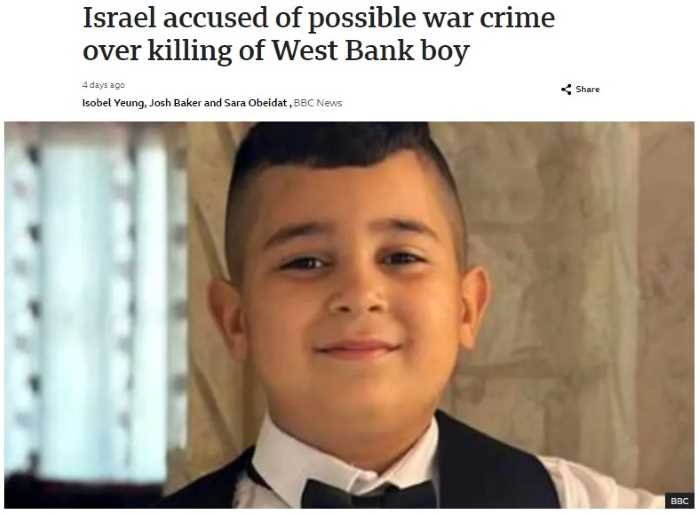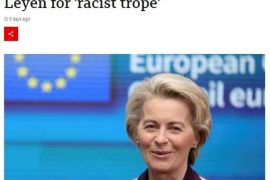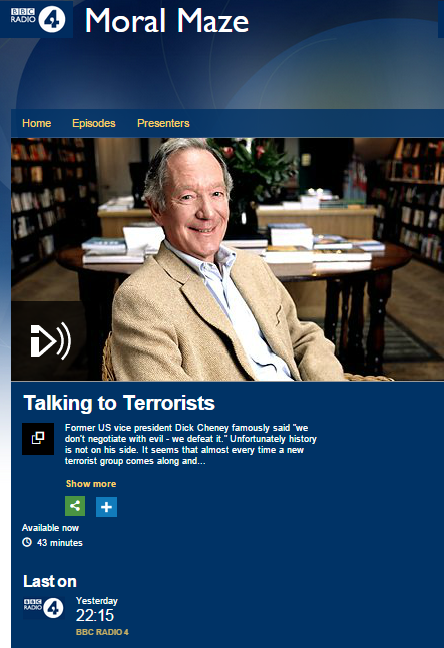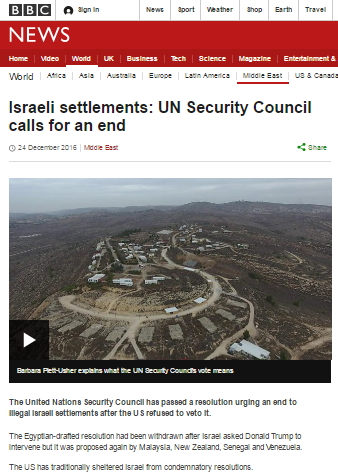As we have noted in the past, one can always tell when the BBC seeks to make waves and influence opinions with a particular story by the amount of exposure it is given on the corporation’s various platforms. Such was the case in early May when a BBC ‘documentary’ was promoted on social media, television, radio and online.
On May 2nd the BBC Three television channel aired ‘The Other War’ (available in the UK here) and on the same day a written version headlined ‘Israel accused of possible war crime over killing of West Bank boy’ was published on the BBC News website. In addition, BBC Verify produced its own filmed report on the story.
Also on May 2nd the story was promoted on BBC Radio 4’s ‘Today’ programme (from 03:08 [news bulletin] and from 1:50:04 here) and on the BBC World Service radio programmes including ‘Newsday’ (from 00:48 here) and ‘Newshour’ (from 00:36 here and from 30:05 here). The story was also presented in two BBC podcasts which will remain available online for over a year: ‘Newscast’ (from 13:20 here) and ‘The Global Story’.
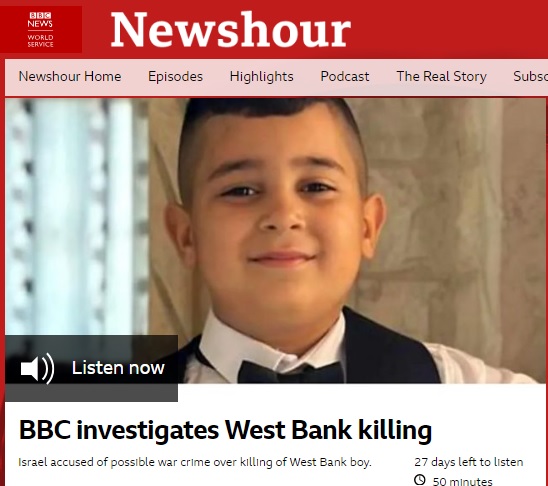
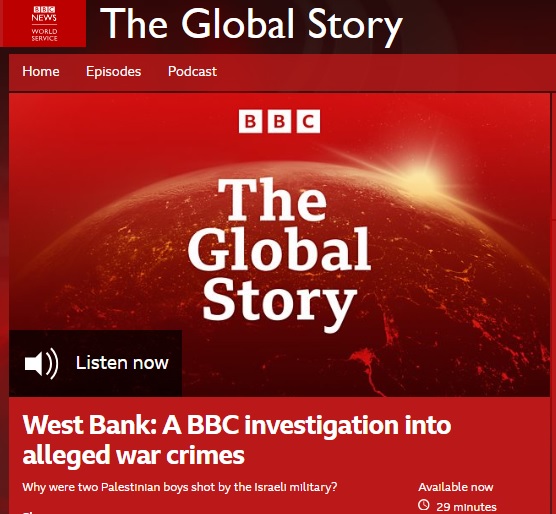
The written version of the story – the one which will remain online as what the BBC calls “permanent public record” – is credited to Isobel Yeung, Josh Baker and Sara Obeidat, with “Additional verification by Tom Spencer and Daniele Palumbo, BBC Verify”. It opens as follows:
“In the early afternoon of 29 November last year, several Palestinian boys descended on to their street in the occupied West Bank, where they often played together.
Minutes later, two of them lay dead from gunshots fired by Israeli soldiers – Basil, 15, and eight-year-old Adam.”
Only in paragraph ten do readers find a brief reference to the all-important context of what was happening when those boys went out onto that street in Jenin – a major hub of Palestinian terrorism:
“Witnesses said gunfire had been ringing out from a nearby operation by Israel’s army in the Jenin refugee camp.”
As was noted here when the BBC’s Lucy Williamson first covered that story in late November 2023, the IDF had begun a counter terror operation at 8 p.m. the previous evening. As was reported at the time:
“Israeli troops killed two senior terror operatives in the West Bank’s Jenin refugee camp during an operation there on Wednesday, the Border Police, Israel Defense Forces and Shin Bet announced in a joint statement.
Muhammad Zubeidi, a senior Palestinian Islamic Jihad operative in the Jenin camp, and Hussam Hanoun, another local operative, were identified as the two operatives killed in the raid. […]
The IDF has said that Zubeidi was the commander of the so-called Jenin Battalion, a local wing of the Islamic Jihad in the West Bank city. […]
Zubeidi and Hanoun were killed during the raid when troops surrounded a building in the camp where the operatives were holed up and opened fire. The troops later entered the building and seized two assault rifles from the bodies.”
Notably, those two terrorists are not mentioned at all in the article by Yeung and her colleagues and thus – like Williamson – they manage to avoid the question of why the parents of those “several Palestinian boys” allowed them to go out onto the street while a counter-terror operation was in progress.
Failing to provide any historical background concerning the war which brought to an end Jordan’s 19-year illegal occupation of what it renamed “the West Bank” and refraining from clarifying that Area A is under Palestinian rule, Yeung et al go on to tell BBC audiences that: [emphasis added]
“As part of an investigation into the conduct of Israel’s security forces in the West Bank, which has been under military occupation for more than half a century, the BBC has pieced together what happened on the day the two boys were killed.”
Readers are told that:
“Video footage from 29 November shows Basil standing next to a hardware store, its shutters firmly locked down. […]
A few hundred metres away, a convoy of at least six armoured Israeli military vehicles turned a corner and began heading towards the boys, who clearly became uneasy. Several of the boys started to move away.
At this precise moment, mobile phone footage shows the front door of an armoured vehicle opened. The soldier inside had a direct view of the boys. Basil had darted into the middle of the road, while Adam was 12m further from the soldiers, running away.
Then at least 11 gunshots rang out. […]
Medical reports obtained by the BBC show that two shots hit Basil in the chest.
Another bullet struck eight-year-old Adam in the back of the head as he ran away; his older brother Baha desperately tried to drag him to cover, leaving a trail of blood as he screamed for an ambulance. […]
Before being shot, Basil can be seen clutching something in his hand. It is not clear what it is. The IDF later shared a picture taken at the scene, which it says shows an explosive device.”
A video embedded into the written report shows a clip from the filmed version which repeats the same “not clear what it is” claim.
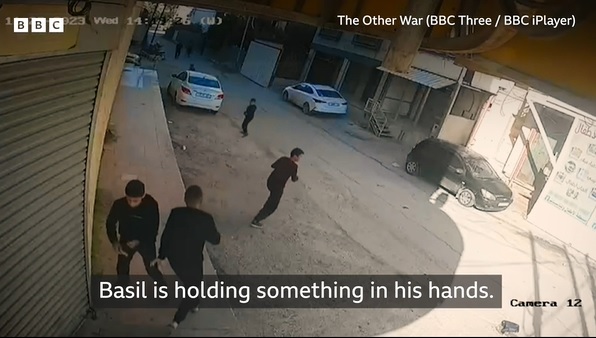
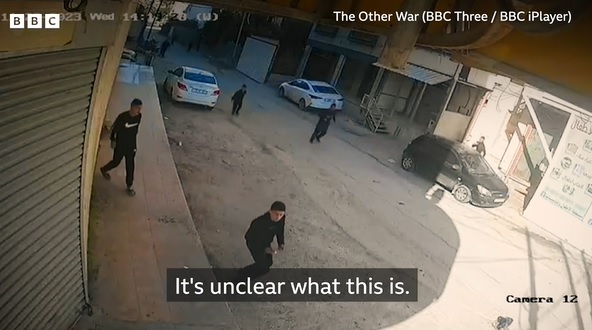
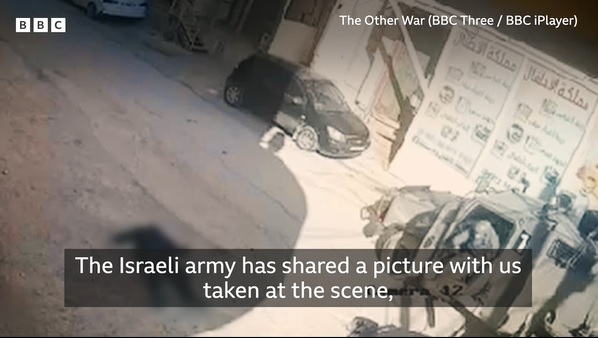
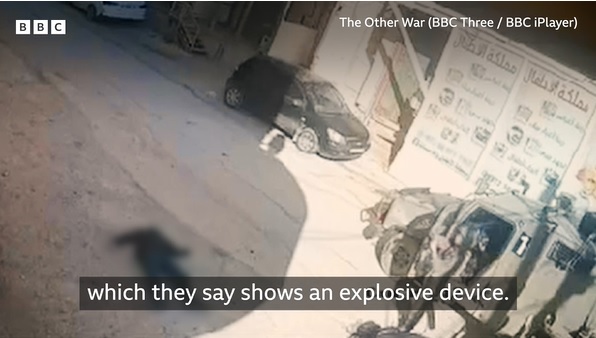
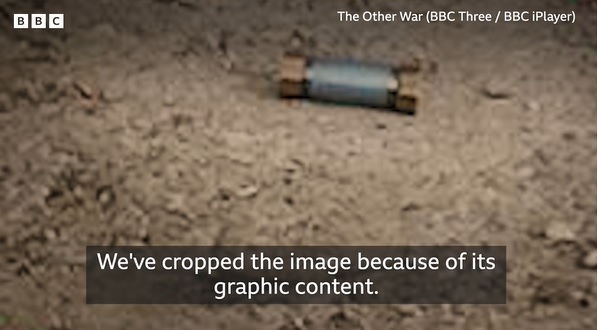
What that footage actually shows is Basel Abu al-Wafa trying to ignite a pipe bomb with a lighter. Even the PFLP-linked anti-Israel NGO DCI-Palestine reported at the time that Abu al-Wafa “was allegedly attempting to throw a homemade explosive device at the time Israeli forces shot and killed him”.
Notably, the fact that – as reported by Reuters and others – Hamas claimed Basel Abu al-Wafa as a member of that terrorist organisation and he was buried in a Hamas flag is completely absent from Yeung’s account.
In addition to that story about a 15-year-old Hamas operative being shot while trying to attack IDF forces with a pipe bomb as one of his friends filmed it on his phone and an 8-year-old standing a few meters behind him apparently having been hit by one of the bullets, Yeung and her colleagues have more tales to tell.
“With violence having surged in the West Bank in the months since Hamas’s attack on Israel from Gaza on 7 October, the BBC has also found evidence of Palestinian homes being vandalised with graffiti, Palestinian civilians threatened with weapons and told to leave the territory for neighbouring Jordan, and the possible mutilation of the body of a Palestinian gunman.”
That “evidence” is in fact unverified accounts from local Palestinians which the BBC is obviously happy to promote on multiple platforms regardless of its inability to confirm the claims.
“The BBC witnessed a 45-hour military operation by Israel in Tulkarm refugee camp in January 2024, targeting an armed group known locally as the Resistance [sic].
Afterwards, several Palestinians told us they had been threatened by soldiers at gunpoint and told to move to neighbouring Jordan. The IDF has said it will review any complaints about civilians being threatened.”
Obviously of no interest to Yeung and her colleagues is the fact that during that counter-terrorism operation:
“…the IDF says troops scanned around 1,000 buildings and located more than 400 explosive devices, and seized 27 weapons and other military equipment.
Five explosive manufacturing labs and four sites used by local terror operatives to observe Israeli forces using surveillance cameras were also located and destroyed, the IDF says.
Engineering vehicles uncovered and destroyed dozens of explosives hidden under the roads of the camp, the IDF says.”
Throughout their article Yeung and her colleagues use second-hand quotes from unidentified “former Israeli soldiers” without clarification of whether or not they belong to a political NGO such as ‘Breaking the Silence’ which often contributes to BBC content.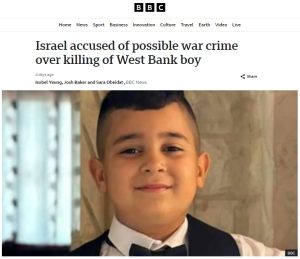
“But several former Israeli soldiers who viewed the BBC’s evidence said they believed Israel’s legal system would protect soldiers who used lethal force, regardless of whether it was justified.”
“Some of the former Israeli soldiers who reviewed the BBC’s evidence said they were afraid that the culture of IDF operations in the West Bank was further stoking Palestinian armed resistance.”
Those “former Israeli soldiers” also apparently managed to cause the BBC to misrepresent IDF protocols:
“While the IDF keeps its exact rules of engagement secret, former and serving Israeli soldiers told us the use of lethal force was meant to be a last resort where there is a real and imminent danger to life. A staged approach should be taken.
They say this begins with a verbal warning in Arabic and Hebrew, before escalating to the use of non-lethal weapons such as tear gas, then shooting at the legs, all before shooting to kill.”
The report also includes quotes from the political NGOs ‘Yesh Din’ and ‘Diakonia’ without complying with BBC editorial guidelines concerning ‘contributors’ affiliations’ which would require audiences to be informed, for example, that:
“In July 2023, Diakonia published a legal brief titled “Excessive Force: A Legal Analysis of Israel’s Operation in Jenin Refugee Camp,” which called on third states to “Exercise ‘due diligence’ and exert pressure on Israel to end ongoing violations of IHL (for example, by means of withholding support)” and “Cooperate with the investigation of international accountability mechanisms such as the ICC.””
Readers of the report by Yeung, Baker and Obeidat are told that:
“Footage of the Hamas attack on 7 October, in which about 1,200 people were killed and 253 taken hostage, outraged the Israeli public and shocked the world. Since then, the world’s attention has been focused on the war and humanitarian crisis in Gaza, where more than 34,000 people have been killed, according to the territory’s Hamas-run health ministry.”
Apparently Yeung et al do not appreciate that there is barely a household in Israel which has not been affected by the unprecedented slaughter on October 7th and that “footage” of those massacres is secondary. They continue:
“At the same time, military operations by Israel have also surged in the occupied West Bank, making last year the deadliest year on record for children there.
A total of 124 children were killed in 2023, according to Unicef – 85 of whom were reported killed after 7 October.”
Raising ethical questions about patient confidentiality, the report later states:
“The BBC was given access by the Palestinian Authority-run health ministry in the West Bank to medical reports of 112 children, aged between two and 17, who were killed by Israeli fire between January 2023 and January 2024. We cannot know the exact circumstances of all of these shootings, and it is possible that some genuinely posed a threat to the lives of Israeli soldiers.
But our analysis showed that about 98% of them had injuries to the upper body, where a shot is more likely to be fatal, meaning that soldiers could be shooting to kill more often than wound in these cases.
It raises questions about whether soldiers are following the rules of engagement in the West Bank and the culture around how they use lethal force.”
As we documented here during the first nine months of 2023, the majority of minors killed during that time were engaged in terrorism or acts of violence at the time of their deaths.
As is evident from the title and content of this report, its aim – and that of the ‘documentary’ upon which it is based – is to persuade readers and viewers that Israel is committing ‘war crimes’:
“The evidence we found has prompted Ben Saul, UN special rapporteur on human rights and counter-terrorism, to say the death of Adam appears to be a “war crime”.” […]
“Evidence from our investigation of the scene was shared with a number of independent experts, including human rights lawyers, a war crimes investigator and a counter-terrorism expert, as well as members of the UN and other, neutral bodies. Some gave their analysis anonymously. […]
Ben Saul, the UN special rapporteur on human rights and counter-terrorism, said there may be questions about whether lethal force could have been used legally in Basil’s case, if he was holding an explosive.
“For Adam, this appears to be a violation of the International Humanitarian Law prohibitions on deliberately, indiscriminately or disproportionately attacking civilians, a war crime, and a violation of the human right to life,” Mr Saul said.”
Ben Saul began his role as ‘UN Special Rapporteur on Human Rights and Counter-terrorism’ in November 2023 despite years of anti-Israel activism, including support for boycotts. As we have noted in the past, UN Special Rapporteurs are not UN employees or “members”.
Since his appointment (and before), Professor Saul has done little to reassure observers of his ‘neutrality’ on the topic of the Arab-Israeli conflict.
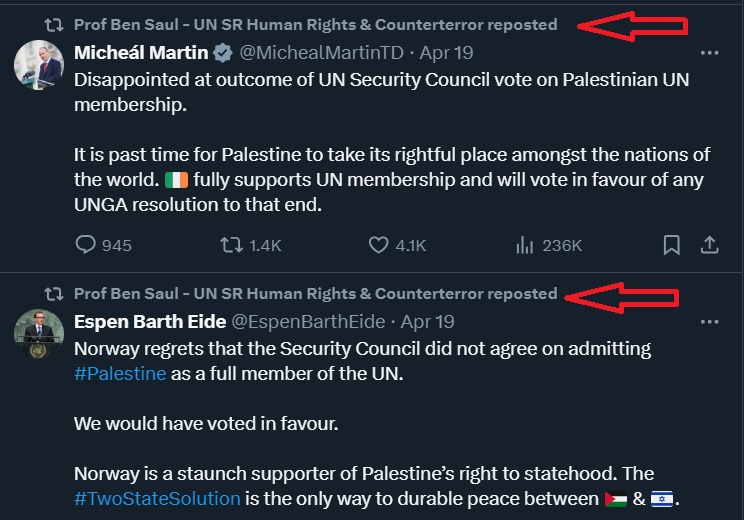
In an interview with an Israeli TV channel in March, counter-terrorism expert Ben Saul declined to classify Hamas as a terrorist organisation.
Since February Saul has been campaigning to prevent arms exports to Israel.
“Any transfer of weapons or ammunition to Israel that would be used in Gaza is likely to violate international humanitarian law and must cease immediately, UN experts* warned today. […]
The experts urged other States to immediately halt arms transfers to Israel, including export licenses and military aid. The United States and Germany are by far the largest arms exporters and shipments have increased since 7 October 2023. Other military exporters include France, the United Kingdom, Canada and Australia.”
In March Saul gave a briefing to members of the UK parliament on that topic, clearly having no problem appearing alongside a representative of the political NGO ‘Al Haq’, which is linked to the PFLP terrorist organisation.
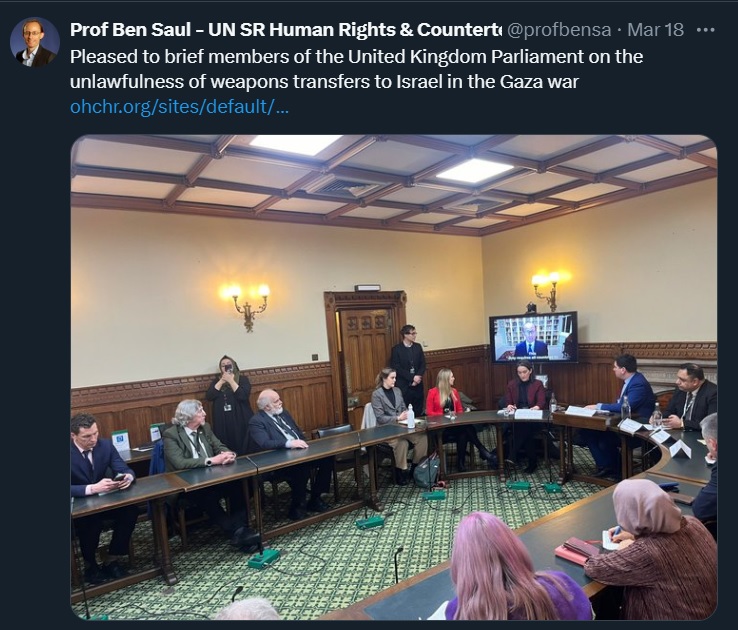
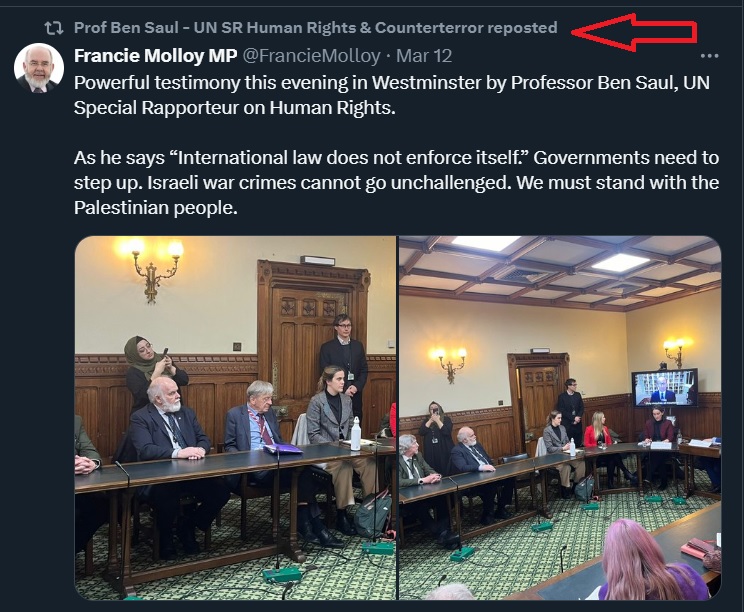
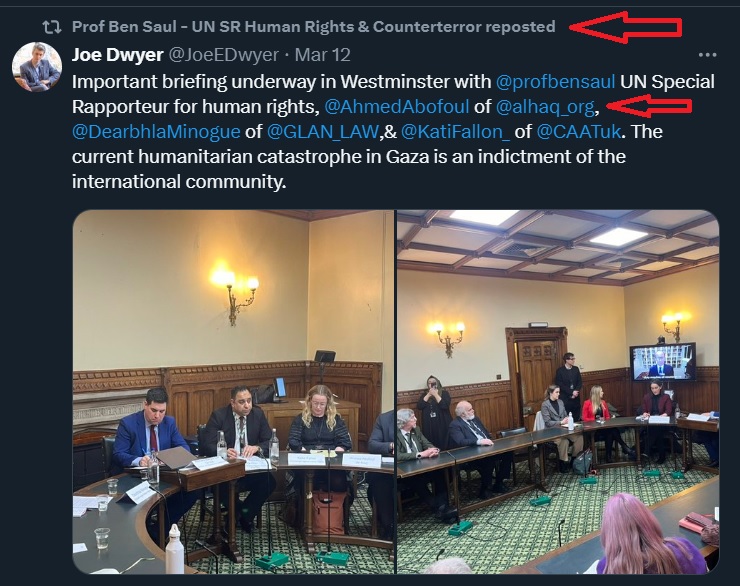
Nevertheless, this is one of the supposedly impartial ‘experts’ whom the BBC chose to approach and quote in order to promote to its audiences the preconceived narrative that Israel is guilty of ‘war crimes’.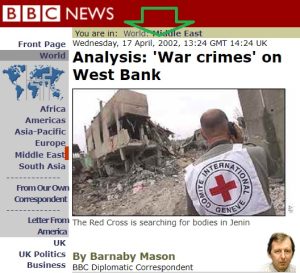
Twenty-two years ago, the BBC promoted claims of a ‘massacre’ in Jenin and brought in ‘experts’ to back up those allegations while similarly promoting the redundant notion of ‘war crimes’.
MYTHS AND LETHAL NARRATIVES ON THE BBC WEBSITE
Clearly the BBC has learned nothing from its extensive promotion of a ‘massacre’ that did not happen in April 2002 and it continues to amplify political activism aimed at delegitimising Israel in the guise of ‘investigative journalism’.

